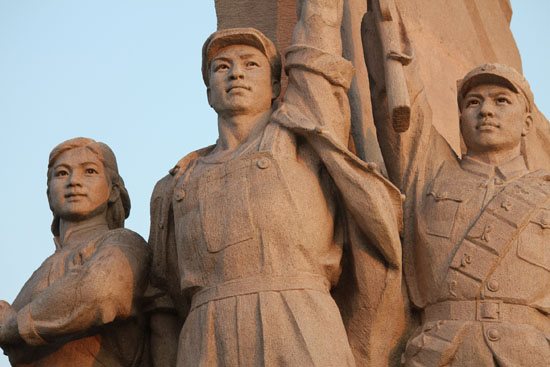In the Heat of the Sun is set in Beijing during the madness of the Cultural Revolution – Chairman Mao’s heyday. But it is not really a story about politics, the Party or China, although all these elements provide context, it is a story about youth and memories.
The film is narrated by the grown-up voice of the central character - Ma Xiaojun, or Monkey, a teenager in the 1970s – and the viewer sees the period as he remembers it.
Monkey and his gang of friends are left to roam Beijing, a city seemingly devoid of adults, who have been sent to rural labour camps or drafted to fight the cause in far-flung provinces.
For Monkey and his mates, the long, hot summer depicted in the film, was the defining one of their adolescence; therefore, what was a tumultuous period in China’s history is portrayed in a nostalgic, rose-tinted, dreamy way as that’s how the adult Monkey recalls it.
"Change has wiped out my memories. I can't tell what's imagined from what's real,” he begins the film.
Memories
It was my granddad’s 90th birthday at the end of last month and the family – he has eight children - organised a bit of a shindig at the local bowls club to celebrate.
As much as I love travelling and being based in intrepid corners of the globe, it is always tough missing out on such special occasions. But in Beijing, in a funny way, I was able to mark the 90-year milestone.
Last month in China plans were also underway for a special birthday celebration – the Communist Party of China was, like my Pop, turned 90.
The country was besieged by "red" fever: I edited countless stories on red film festivals, red tourism, and red parades; the China Daily website, which I intern at, literally turned red, as did the newspaper’s leading headlines. A a big-budget, star-studded movie telling the story of the party’s advent hit cinemas and staff were given free tickets to see it; and on the big day itself, we ran live online coverage of the official red commemorations.
Birthdays are a time for reflection - in the same way I am sure my Pop and his friends and family would have yarned about the achievements, challenges and changes of nine decades, so too did Chinese media and politicians use the milestone as an opportunity to reflect on the history, and the future, of the party.
I found it especially interesting to read comment pieces by old-timers, who obviously have a deep love for the Party and proud memories of its early revolutionary years.
Their commentaries took me back to Monkey’s opening line in the film, "Change has wiped out my memories. I can't tell what's imagined from what's real.”
Personal histories
Political stories or histories are also individual histories. For example, my grandad fought in World War Two. The political event cannot be separated from his personal history.
In addition, history is framed by whoever is telling the story.
In a speech at a ceremony in Beijing to mark the occasion – the Communist Party’s 90 years as opposed to Pop’s – Chinese President Hu Jintao said the organisation had experienced many “growing pains” in its history, glossing over much of the Party’s past challenges.
He was however realistic about contemporary challenges faced by the Party, saying corruption and subsequent alienation from the people was the greatest challenge to the party since it gained power.
“Keeping close ties with the masses is our party’s biggest political advantage. Breaking away from the masses is the biggest danger to our party. Only when we take the masses as our dear ones will the masses take us as their dear ones.”
The youthful Monkey of In the Heat of the Sun lived through an epic chapter in the Party’s history, yet political events were sidelined to teenage adventures. I wonder how many young people are willing to embrace a political party - to consider it a "dear one".
Youth
You wouldn’t usually expect to hear Lady Gaga, a Taiwanese boy band and communist revolutionary songs all on the same playlist – but at a karaoke joint in Beijing, no one, except me, batted an eyelid.
It was the leaving do for one of my newsroom colleagues. On a Monday night after work, a troupe of us met in a private karaoke room of the chandelier-adorned, conference-centre-like “Party World”, a block away from the office.
On the wall next to the switches for controlling the disco lights, was a laminated sign: “No gambling, no prostitutes”. But the proprietors didn’t have to be concerned about potential shenanigans from this crowd, they were here for the tunes and some innocent no-bets-needed dice games, Chinese tea and popcorn all round.
It was the sort of leaving do that would have been considered pretty lame at home, but, for whatever reason, it worked here. Everyone had a blast.
At most gatherings that rely on people choosing music to play to a crowd, there is that lull in proceedings, when the band, DJ or karaoke enthusiast gets a little too self-indulgent. You know what I mean, Kiwis respond to it with: “Play something we all know bro!”
The crowd rouser in this neck of the woods seems to be ‘red’ or communist revolutionary songs. These anthems were sing-along numbers, forcing even the more timid bench-warmer singers to belt out the chorus.
Most of my colleagues are in their early 20s and a few of them are Communist Party members, but despite the rousing renditions of the political tunes, none of them seem particularly political. The same goes for most of the young Chinese I have talked with during my time here.
Uneasy topic
You could argue that politics is not an easy conversation topic in a culture where freedom of expression is readily curbed, so people generally steer clear of it, or perhaps, as with many places in the world, the vast majority of youthful citizens are simply apathetic, taking the pragmatic approach of working within a system they largely feel they can have little impact on.
It is hard to know if they sing the songs out of patriotism, a sense of camaraderie, or just for a bit of entertainment. Probably a mix of it all.
“If the older generation were here, they would be singing these songs, hands on heart,” someone shouted to me over the din.

CHINA THROUGH CINEMA
Reporter Kim Bowden reviews a series of films as she attends the "China Through Cinema" events. She provides a glimpse into life in Beijing, a rapidly evolving city with an incredible history. Today she discusses Jiang Wen's 1994 debut In the Heat of the Sun.



